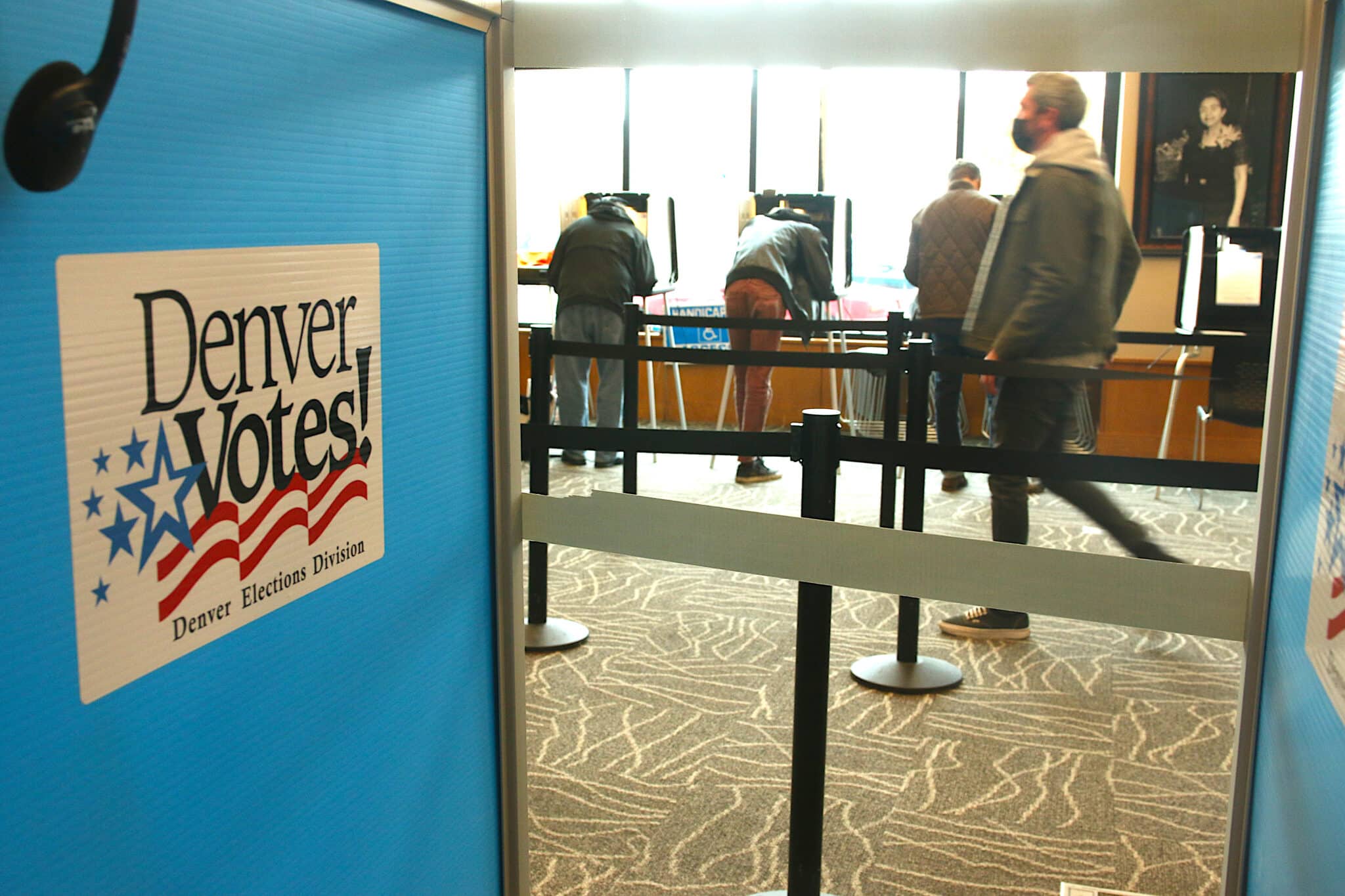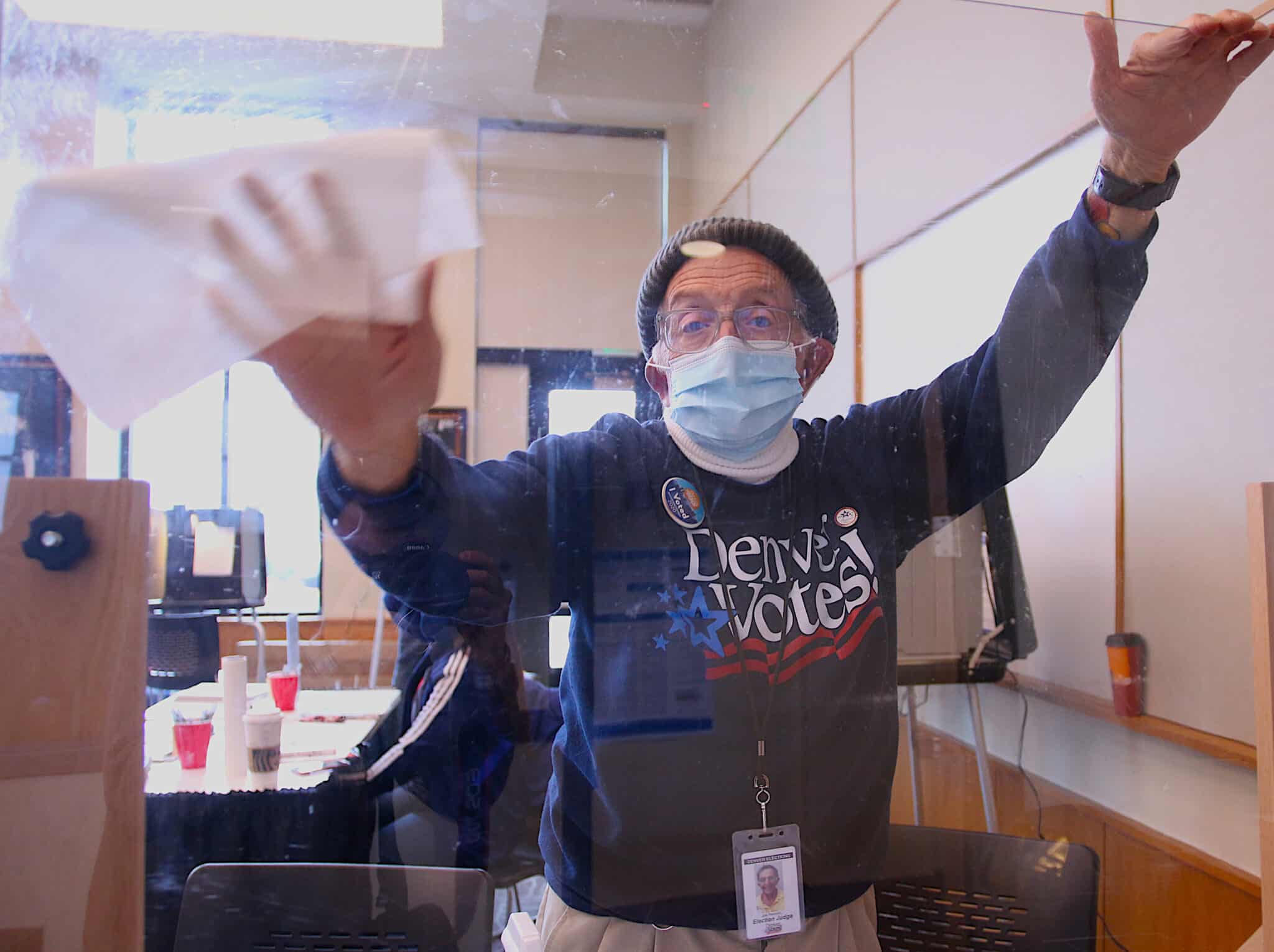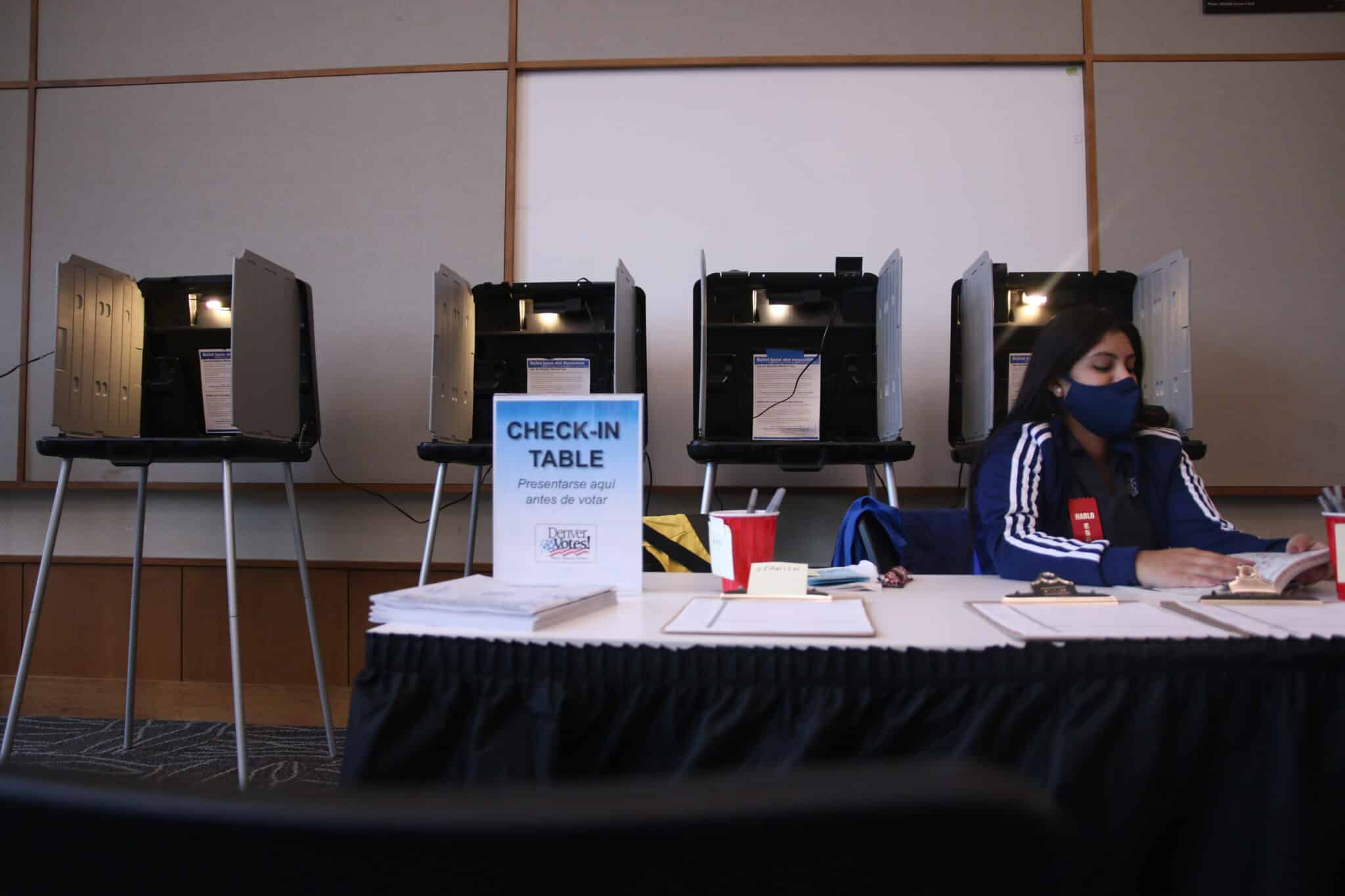
Voters arrive Tuesday at the Blair-Caldwell African American Research Library in Five Points. (Eric Heinz photos)
Along with the future of the Park Hill Golf Club property, Tuesday’s ballot initiatives dealt with the city’s camping ban, the local sales tax rate and raising the cannabis tax for pandemic research.
Here’s how those measures were faring as of 11:30 p.m.:
Initiative 303: Camping ban enforcement
Denver voters appear to have rejected an initiative that would have altered the way the city responds to complaints of homeless encampments, per Tuesday’s unofficial results, by a margin of 55.4 percent to 44.6 percent.
What drew the attention of the City Attorney’s Office was Initiative 303, which (if it passes) would compel the city to respond to complaints about homeless camping on private and public property.
Initiative 303 was reduced Sunday night when a Denver County District Court judge ruled that a section of it that asks voters whether to require the city to respond to a complaint of a homeless encampment within 72 hours is unlawful.
The measure was spearheaded by Denver Republican Party Chairman Garrett Flicker, who said he will file an appeal if the measure passes.
The rest of the initiative is still on the ballot. The first two sections of Initiative 303 ask voters whether to require the city to enforce its ban on unauthorized camping on private and public property.

Joe Pennino, a Denver Elections Division support judge, cleans a partition used to protect poll workers from COVID-19 on Tuesday.
It also would reduce the number of sanctioned camping sites on public property to four. The city currently allows two sanctioned camping sites, one at Park Hill United Methodist Church that will close at the end of the year and one on the Regis University campus that will close after March.
A third is planned to be established in the Lincoln Park neighborhood by next week on land owned by Denver Health. None of the sites are on public land.
Initiative 304: Sales tax cap
Voters opposed a proposal to cap Denver’s sales and use tax, with results currently 62.1 percent to 37.8 percent.
Initiative 304 would have required Denver to max out its sales and use tax at 4.5 percent. It is currently at 4.81 percent.
Proponents of the initiative said taxes in Denver and throughout the state harm the lowest income earners, who pay more proportionally in taxes than people making more than $200,000.
City officials said this would cut about $80 million immediately and in subsequent years from the city’s budget.
Initiative 300: Tax cannabis for pandemic research
So far it appears voters will also reject a proposal to raise Denver’s marijuana tax in order to provide funding for pandemic research 59.7 percent to 40.2 percent.

The city’s turnout for this election was about 22 percent as of Tuesday night, which is nearly 103,000 ballots cast.
Initiative 300 would raise the sales and use tax on marijuana 1.5 percent to raise $7 million for pandemic research at the University of Colorado Denver.
Proponents said the money needs to be used for research on the virus, and opponents said the measure is not something the university sought.
Turnout
According to data provided by the Denver Elections Division, the city’s turnout for this election was about 22 percent as of Tuesday night, which is nearly 103,000 ballots cast.
Alton Dillard, a communications manager for the division, said if a surge of ballots came in on Monday and Tuesday, the division would stop counting at midnight and resume Wednesday morning.
Dillard said the next release of results will be 5 p.m. Wednesday.
Unofficial results can be counted through Wednesday, and official certification finishes no later than 17 days from an election day that is not a primary.

Voters arrive Tuesday at the Blair-Caldwell African American Research Library in Five Points. (Eric Heinz photos)
Along with the future of the Park Hill Golf Club property, Tuesday’s ballot initiatives dealt with the city’s camping ban, the local sales tax rate and raising the cannabis tax for pandemic research.
Here’s how those measures were faring as of 11:30 p.m.:
Initiative 303: Camping ban enforcement
Denver voters appear to have rejected an initiative that would have altered the way the city responds to complaints of homeless encampments, per Tuesday’s unofficial results, by a margin of 55.4 percent to 44.6 percent.
What drew the attention of the City Attorney’s Office was Initiative 303, which (if it passes) would compel the city to respond to complaints about homeless camping on private and public property.
Initiative 303 was reduced Sunday night when a Denver County District Court judge ruled that a section of it that asks voters whether to require the city to respond to a complaint of a homeless encampment within 72 hours is unlawful.
The measure was spearheaded by Denver Republican Party Chairman Garrett Flicker, who said he will file an appeal if the measure passes.
The rest of the initiative is still on the ballot. The first two sections of Initiative 303 ask voters whether to require the city to enforce its ban on unauthorized camping on private and public property.

Joe Pennino, a Denver Elections Division support judge, cleans a partition used to protect poll workers from COVID-19 on Tuesday.
It also would reduce the number of sanctioned camping sites on public property to four. The city currently allows two sanctioned camping sites, one at Park Hill United Methodist Church that will close at the end of the year and one on the Regis University campus that will close after March.
A third is planned to be established in the Lincoln Park neighborhood by next week on land owned by Denver Health. None of the sites are on public land.
Initiative 304: Sales tax cap
Voters opposed a proposal to cap Denver’s sales and use tax, with results currently 62.1 percent to 37.8 percent.
Initiative 304 would have required Denver to max out its sales and use tax at 4.5 percent. It is currently at 4.81 percent.
Proponents of the initiative said taxes in Denver and throughout the state harm the lowest income earners, who pay more proportionally in taxes than people making more than $200,000.
City officials said this would cut about $80 million immediately and in subsequent years from the city’s budget.
Initiative 300: Tax cannabis for pandemic research
So far it appears voters will also reject a proposal to raise Denver’s marijuana tax in order to provide funding for pandemic research 59.7 percent to 40.2 percent.

The city’s turnout for this election was about 22 percent as of Tuesday night, which is nearly 103,000 ballots cast.
Initiative 300 would raise the sales and use tax on marijuana 1.5 percent to raise $7 million for pandemic research at the University of Colorado Denver.
Proponents said the money needs to be used for research on the virus, and opponents said the measure is not something the university sought.
Turnout
According to data provided by the Denver Elections Division, the city’s turnout for this election was about 22 percent as of Tuesday night, which is nearly 103,000 ballots cast.
Alton Dillard, a communications manager for the division, said if a surge of ballots came in on Monday and Tuesday, the division would stop counting at midnight and resume Wednesday morning.
Dillard said the next release of results will be 5 p.m. Wednesday.
Unofficial results can be counted through Wednesday, and official certification finishes no later than 17 days from an election day that is not a primary.
